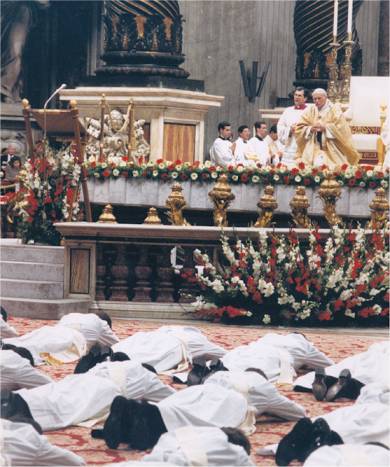Continuing our series from Monday and Tuesday, we take a look today at Wednesday's Gospel, this time shifting from John earlier in the week to Matthew's account of the betrayal. Because of Judas' treachery, this has commonly come to be known as 'Spy Wednesday,' because 'from that hour, he looked for an opportunity to hand him over.'
As you can see from the combox postings of the previous two iterations of this series, there are certainly a variety of thoughts and theories as to the question of 'Qhy did Judas stay?' While all these are certainly valid interpretations, one seems to have been missed: Judas as a Revolutionary.
There seems to be some tradition that Judas was a member of the Zealots, one of four distinct parties within Judaism at the time of Jesus (Pharisees, Sadducees, and Essenes being the others.) The main thrust of the Zealots was a desire to see Israel re-established as an independent nation, free from the tyranny of Roman authority. This polictical movement was spawned by the longing of the Israelites for a return of the Davidic Monarchy, which was crushed by the Babylonians, yet God promised that 'I will establish your dynasty for ever.' I can see the Zealots thinking: "Hmm, maybe we should force God's hand..."
In this line of the thinking, the Messiah was NOT one who came preaching peace, forgiveness, 'turn the other cheek.' I think we are so used to hearing these maxims that we do not realize how revolutionary they are. Instead, the Zealots desired a Messiah who was a warrior king, a terrible figure who would establish Jerusalem as the center of the known world over and against the Romans.
If we bring these possible expectations to bear, and incorporate the great insight that Tara had in yesterday's post, that Judas was a 'hanger on,' he had these political machinations in the back of his head and found himself as part of the 'Center of Attention' hanging on to Jesus' coattails, so to speak, plus he had some type of control over the group because he had the money bag, it seems a pretty easy jump to where he starts to get an idea of where this whole thing should go, yet 'the authority' is going that way, so let me see if I can force his hand...
This interpretation, and it is my rumination on a Thursday morning, nothing more, has some interesting impact for today, as well. We have all heard stories of lay ministers run amok, or as Sharon also asked in yesterday's combox: "Why do some priests remain in the Church and make it very plain to their congregations that their heart is not in it?" I don't know the answer to that, but there is a pithy little saying that has a fair amount of truth to it in this case: "Power corrupts, and absolute power corrupts absolutely." Priests have power, and just a ruler can begin as a Benevolent Dictator, the result of no one challenging you, questioning your authority (with respect and in love), it is very easy to drop the 'Benevoent' and just turn into a Despot.
The moral, or a moral, of this week's Gospel Lections during Mass: beware of power, remember we come to serve, and we experience a great lesson in that this evening at the Mass of the Lord's Supper.
One further point of clarification from yesterday's readings: 30 pieces of silver. Noting that Matthew's intended audience is primarily Jewish, any detail like this should have us scouring the Old Testament (aka Jewish Scriptures) to find a connection. In Genesis 37:28, the sons of Israel "sold Joseph to the Ishmaelites for twenty pieces of silver."
This begins the process of Joseph considered to be dead (note bene: Jesus did truly die!) and 'comes back to life' to save the people, in his case from starvation in the land of Canaan. In the case of Our Lord, Jesus saves the people from Sin and death, but Matthew gives us another indication here of the great mystery of our salvation that began way back when and is now coming to fruition here in Jesus. This is not a solitary event that happens in a vacuum, this is the restoration of the 'Happy Fault, oh necessary sin of Adam, which earned for us so great a Redeemer.'
Have a great Holy Week!
Thursday, March 20, 2008
Subscribe to:
Post Comments (Atom)










4 comments:
I thought Judas the Zealot and Judas Iscariot were different apostles. Am I wrong?
Wikipedia has an interesting article on Judas, and some of the many paradoxes.
http://en.wikipedia.org/wiki/Judas_Iscariot
It is impossible for us to know his fate. Damnation does seem a reasonable conclusion from yesterday's gospel, but not the only one. He seems to have had a conscience, though little compassion for others. A most disturbing suggestion is that we can be aware of doing evil things, and yet we still do them. Propelled to commit evil, events culminated in his own demise.
Great meditations! Thank you, Father.
One thing I didn't see mentioned was that Judas needed to stay around. One of Jesus's close confidants unfortunately had to hand him over. If Judas left, would one of the other twelve had stepped up and ate that morsel? If Judas had left, would we be celebrating the Resurection in a few days?
I feel that he was called to the role he lived. The Father needed someone to hand over his Son.
Father:
I always think it odd that people assume that Judas' betrayl was the only way for Christ to be arrested and hence fulfill His Passion? Why did Judas need to point out who Jesus was?--did not Jesus teach openly in the cities? When he came into a city--everyone knew who Jesus was.
God had a plan, and if Judas had not betrayed our Lord--God would have found another way to fulfill His plan.
Post a Comment